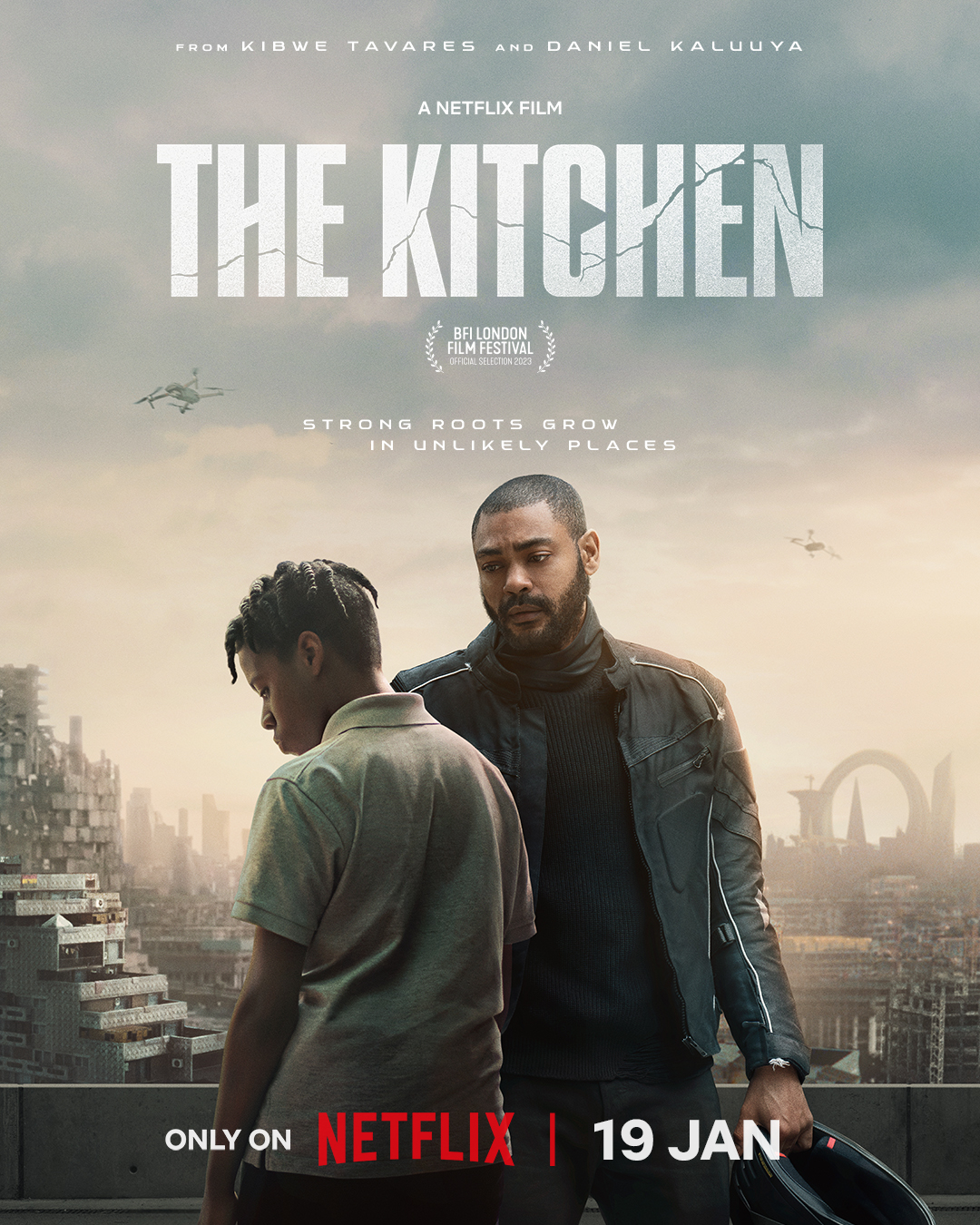Daniel Kaluuya has already reached the tallest heights as an actor, and now he has challenged himself even further and taken on the title of director.
Kaluuya worked alongside Kibwe Tavares to co-direct Netflix's upcoming film The Kitchen. The pair created a futuristic dystopian world in London, where a community fights back as they are being forcibly displaced from a social housing building called The Kitchen—the place they call home.
At first, the film was being described as taking place in 2040 but Kaluuya tells Complex that removing the year from the description allows the audience to tap into their own thoughts and ideas. "In the process, we realized we've created a world and it's interesting for the audience to project what when they think it is," he says. "And whilst if we put a date, we limit that kind of imagination."
The film mainly follows Izi (Kane Robinson) and a child named Benji (Jedaiah Bannerman) and through their eyes the audience sees what life is like for them in The Kitchen, and what it takes for them to survive as law enforcement tries to push the residents of the building out.
In the midst of the turmoil, the people of The Kitchen find ways to help each other out and find joy even in the most dire situation. Kaluuya got the idea from reading about a group of young people in London who were carrying out heists worth millions of dollars, while they were only getting paid $200 for the job.
"That says a lot about class, about education, about people using others to do things for them and them exploiting their lack of self-worth. We were like, what happens when an area says, “No, no, no, we know our self-worth. Fuck you.”' Kaluuya says. "But it was also kind of like saying, 'What about if these kids are not doing it for hedonistic reasons? They're doing it for community reasons?' That means they're doing the wrong thing for the right reason."
The concept of The Kitchen doesn't feel too far off into the future. The story might feel a bit familiar as communities in most major cities are facing some form of gentrification that has displaced families and people from the only places they know. Complex caught up with Kaluuya ahead of the release of the film's trailer and he told us all about how he came up with the idea, and what he hopes people learn after watching The Kitchen.
This has been in development since 2016 from what I read. How does it feel to know the trail is coming out and that the movie is coming out next month? How does it feel to finally have it out there?
It's longer than that. I pitched it 2012, 2013 and we did a taster tape in January 2014. So it will be 10 years exactly. Then when we did the initial taster tape in a barbershop. So I'm very ready to let it go and let people have it saying I really want people to have it. I want people to share it. I want people to enjoy it. I want people to like have it for themselves and open up whatever it needs to, for themselves. So I'm excited for that.
What would you say is the reason it took 10 years?
I was just living life, do you know what I mean? Like various people just living life and we had to grow as artists. I think what we were trying to articulate, it was very big and vast and we had to learn and I think the standard that we wanted for it was higher. And when I started it, I was like, 23 turning 24. So you've just got to learn, you know what I mean? You gotta grow as a craftsperson, as an artist. And so I think me and Kibwe have both been on a journey and growing in order to really tell the story in the way that we saw it.
What made you want to jump behind a camera now? Was that always a goal that you had early on in your career or did it come from your experience as an actor?
I started writing before I acted. I used to write on Skins. I wrote a play when I was nine, I used to write plays when I was 16. That's how I got on Skins as a writer before an actor. So I wrote two episodes Skins. One at 18, I co-wrote another one at 19. And then I said, “Guys, I'm 19. I have nothing to say. I think I've written everything that has happened.” And then I just went to live and then by 23 I had another idea and it was The Kitchen. So I don't see it as one or the other, it's everything.
This is you and Kibwe’s first time directing a feature film. How did you meet him and why did you choose to work with him on this project?
I met him when we did a short film called Jonah that he directed. And then I pitched this idea on the set. It was in Zanzibar and then I spoke to him about it and then I just love the scale and the world-building that he had. And I wanted that for British cinema, I wanted to see our world with that kind of imagination, with that kind of scale. He felt the same way too and he wanted to tell the world about us, about London on a global scale. And so we partnered up and we're here.
You've told so many great American stories in your acting career. How does it feel to be doing this story representing the many cultures and the diversity that lives within London and to represent where you're from with this movie?
It's good, man. It's like everything that I've learned over the course of the past 10 years. The films I've done, the plays that I've done, the TV shows that I've done, the people that I've met, the Q&As that I've sat in and I've been a part of, I've learned a lot about craft. Listening to Q&As from people that I've worked with that they won't open up about certain things, but if someone ask them, they go, “Oh shit.” I'm like, “Wow, that's amazing.”
It's great to tell my truth and, to tell our truth in this, in this space, in cinema. I want globalness but I really believe you have to be specific to be universal. And I didn't really see that a lot in British cinema. So we wanted to do that for sure.
The Kitchen reminds me of gentrification, which is happening in a lot of the major cities in the world. You said you saw a story about kids doing heists in London and that informed some of this movie, but it's also about people being displaced from where they're from. Why was this a story that you wanted to tell?
Yeah, it was because of these kids that were doing a million pound heists in a minute, but they were getting paid £200. So in that, I saw that there's a problem because these kids don't know their worth and they don't know the worth of the stuff they're stealing, you mean? And that open the door. That says a lot about class that says a lot about education that says a lot about people using others to do things for them and not and them exploiting their lack of self-worth. We were like, what happens when an area says, “No, no, no, we know our self-worth. Fuck you.” But it was also kind of like saying what about if these kids are not doing it for like hedonistic reasons? They're doing it for kind of community reasons? That means they're doing the wrong thing for the right reason, kind of.

The cast is wonderful. How did you decide to cast them two as the lead in the movie?
Kano is like a London legend or English legend, like a UK legend in terms of music. So someone that I grew up listening to. He's got a lot of classic material and then his pivot into acting. It was just really interesting to me watching that and I think it was the first series of Top Boy on Netflix when I saw that. And I'm a big Top Boy fan. So when we were finding a person to play Izi, and when Kane was mentioned, I was like, “It has to be him.” He's in need of a movie to show he's a movie star.
Then working with him, his process, his openness and willingness, he gives so much for free. And then Jedaiah, who had basically never acted before, he just has it. When you meet him as a person, he's just that kid, he's just very cheeky, very charismatic and he just has it. He has so much emotional depth and so much soul to him. And then the two together, they just worked, they just worked and I think they're just artists. Kano obviously is an artist but they're artists and so they have ideas and we really encourage them to make the roles their own. We've given a blueprint and then it's about them bringing it to life and they really put breath into, into these, these characters and these people by using their, their humanity and their essence.
What did you learn as a director this time around that you didn't know before as an actor?
How important communication is. It's trust building with people. It's like knowing that you designed a template but how I used to say it is like, this is the cut of the suit. We need to tailor it to you. This is the silhouette but we need to make sure that it fits your type. So we need to make the changes in the script, how do we tailor it to you? And then when you see that it lifts on another level because then the actors inhabit it in a much richer way, which is, I know which I've experienced, but it's just making sure that we’re empowering people and then knowing when people need support and knowing when to give them support. It's just understanding and seeing people for who they are and supporting them for their own processes. But the goal is for them to own the characters.
I learned how to act through improvisation. I did three years from 13 to 16, I just did improv, and didn't touch any scripts. So I'm not wed to lines at all. I think that's when I'm strongest, when I'm acting on set and I'm just kind of saying what I wanna say in the moment, which is honoring what the writer is intending. I feel like to me it's a lot of ego, letting it go, but I'm very much a firm believer that the best idea wins. So, Jedi is 14, I've written this stuff for months and he was just like, “That don't make sense. A kid wouldn't do that.” And I go, “Oh yeah, you're right. We'll go with that." You have to just let that be nimble enough to process it and see what are you thinking in a certain way and let that idea or your thought go and now this kid to inform and know that he has a different point of view and let him go with that.
The Kitchen is set to arrive on Netlfix on January 19.

